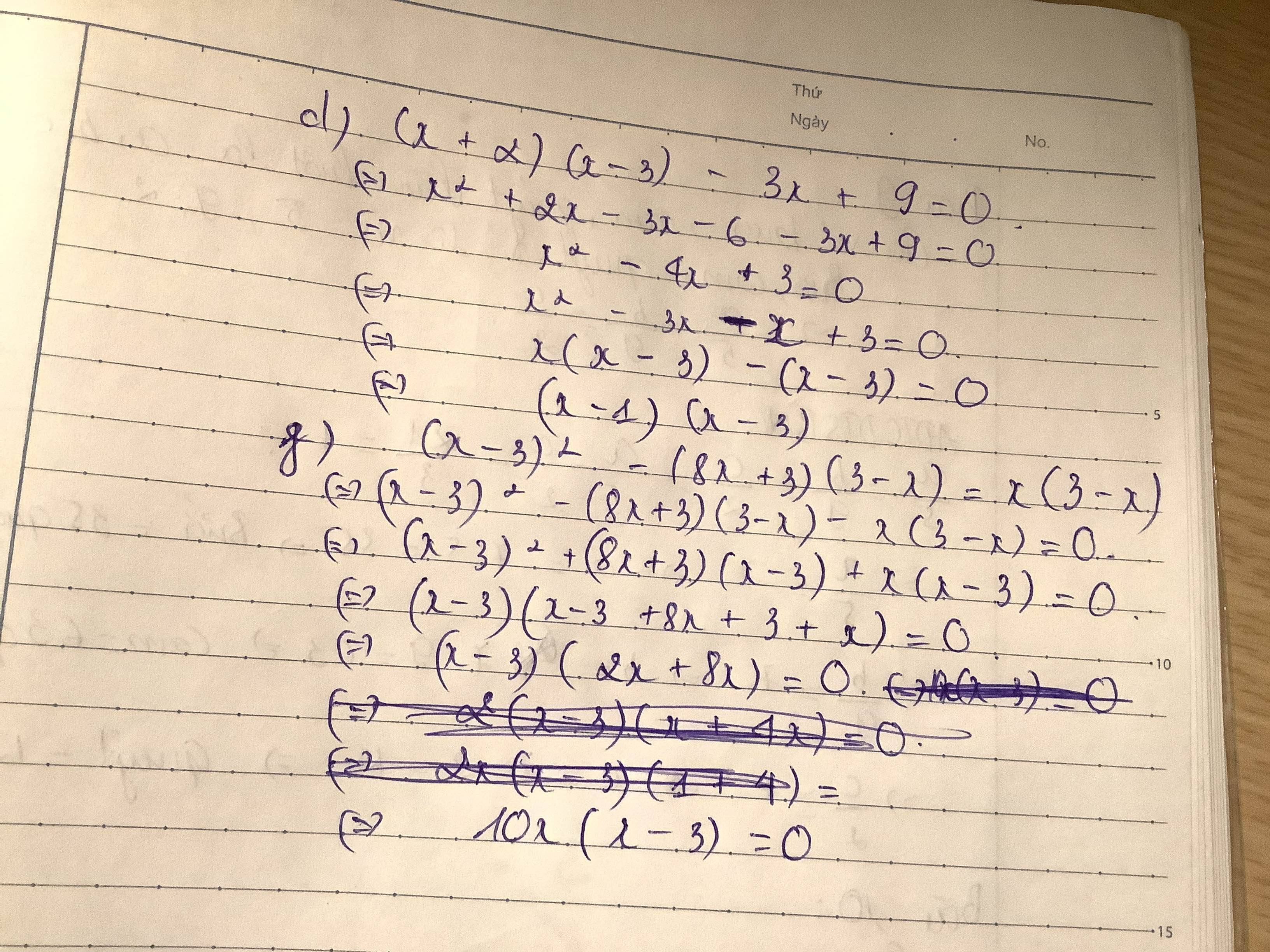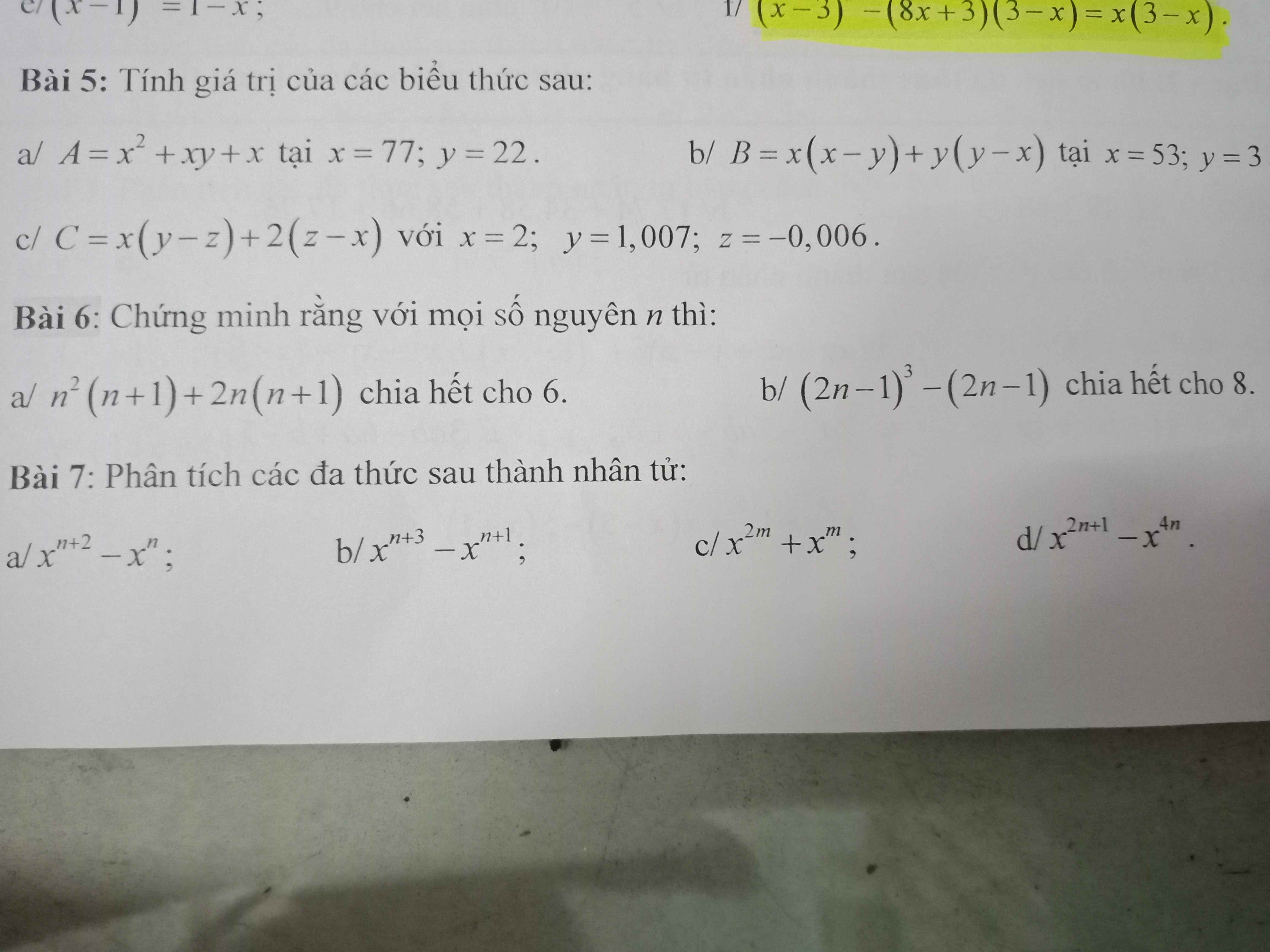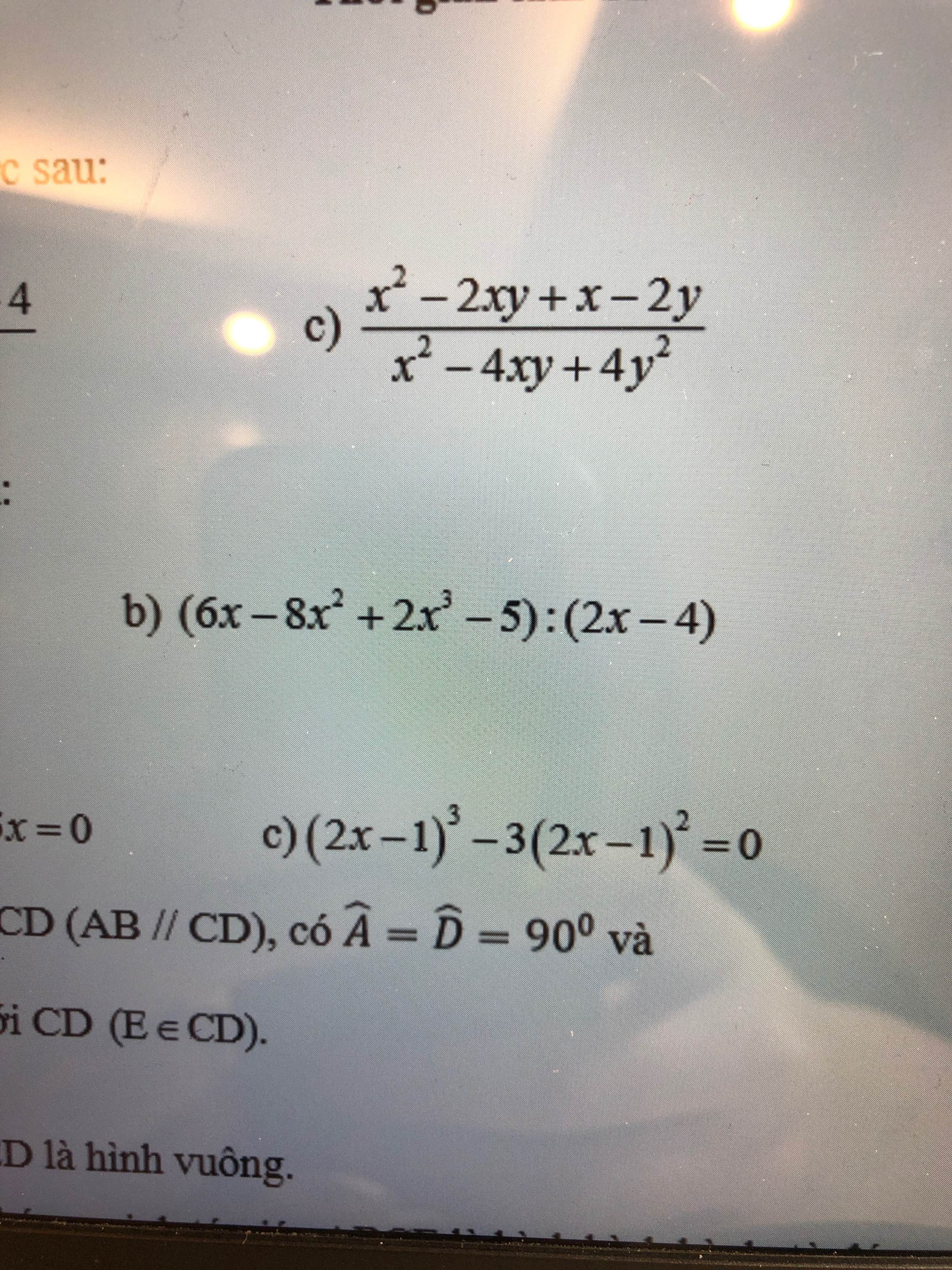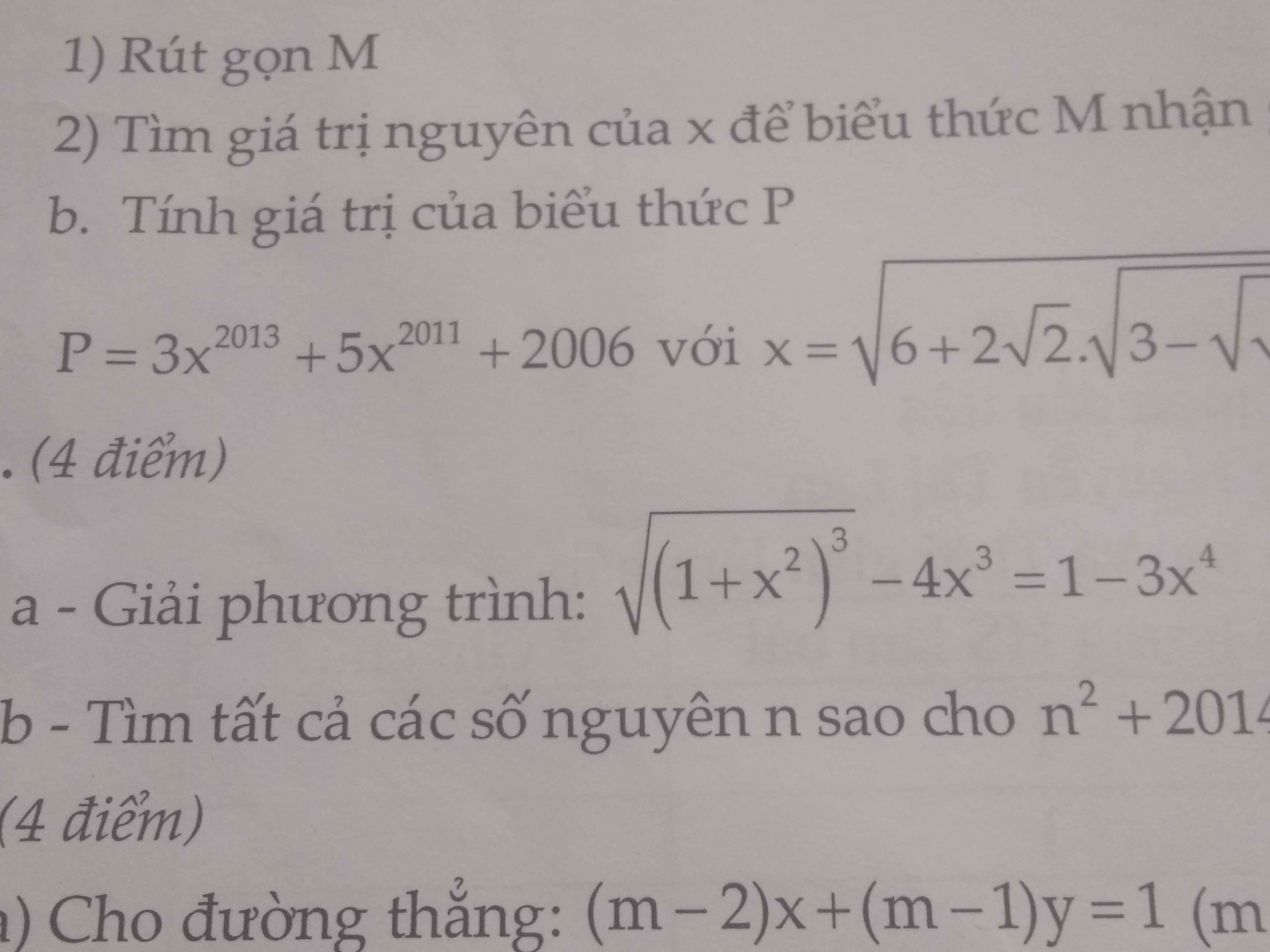Giải hộ mình câu d với câu f. Cảm ơn mn nhiều
Hãy nhập câu hỏi của bạn vào đây, nếu là tài khoản VIP, bạn sẽ được ưu tiên trả lời.



bài 7
\(x^{n+2}-x^n\)
\(=x^{n+2-n}=x^2\)
\(\left(b\right)x^{x+3}-x^{x+1}=x^{x+3-x-1}=X^2\)
c)
\(x^{2m}+x^m=x^{2m+m}=x^{2m}\)
d)
\(x^{2n+1}-x^{4n}=x^{2n+1-4n}=x^{1-2n}\)

\(\dfrac{12}{16}=\dfrac{132}{176}\\ \dfrac{13}{16}=\dfrac{143}{176}\\ Ta.có:\dfrac{16}{22}< \dfrac{132}{176}< \dfrac{17}{22}< \dfrac{143}{176}< \dfrac{18}{22}\\ Vậy:Chọn.số.17\)

1) Vì x=25 thỏa mãn ĐKXĐ nên Thay x=25 vào biểu thức \(A=\dfrac{\sqrt{x}-2}{x+1}\), ta được:
\(A=\dfrac{\sqrt{25}-2}{25+1}=\dfrac{5-2}{25+1}=\dfrac{3}{26}\)
Vậy: Khi x=25 thì \(A=\dfrac{3}{26}\)
2) Ta có: \(B=\dfrac{\sqrt{x}-3}{\sqrt{x}+1}+\dfrac{2x+8\sqrt{x}-6}{x-\sqrt{x}-2}\)
\(=\dfrac{\left(\sqrt{x}-3\right)\left(\sqrt{x}-2\right)}{\left(\sqrt{x}-2\right)\left(\sqrt{x}+1\right)}+\dfrac{2x+8\sqrt{x}-6}{\left(\sqrt{x}-2\right)\left(\sqrt{x}+1\right)}\)
\(=\dfrac{x-5\sqrt{x}+6+2x+8\sqrt{x}-6}{\left(\sqrt{x}-2\right)\left(\sqrt{x}+1\right)}\)
\(=\dfrac{3x+3\sqrt{x}}{\left(\sqrt{x}-2\right)\left(\sqrt{x}+1\right)}\)
\(=\dfrac{3\sqrt{x}\left(\sqrt{x}+1\right)}{\left(\sqrt{x}-2\right)\left(\sqrt{x}+1\right)}\)
\(=\dfrac{3\sqrt{x}}{\sqrt{x}-2}\)


\(2b,=\left(2x^3-4x^2-4x^2+8x-2x+4-9\right):\left(2x-4\right)\\ =\left[\left(2x-4\right)\left(x^2-2x-2\right)-9\right]:\left(2x-4\right)\\ =x^2-2x-2\left(\text{ dư -9}\right)\)

a) \(\left(x+2\right)^2=4\left(2x-1\right)^2\)
\(\left(x+2\right)^2-4\left(2x-1\right)^2=0\)
\(\left(x+2\right)^2-\left[2\left(2x-1\right)\right]^2=0\)
\(\left(x+2\right)^2-\left(4x-2\right)^2=0\)
\(\left(x+2-4x+2\right)\left(x+2+4x-2\right)=0\)
\(6x\left(-3x+4\right)=0\)
\(\Rightarrow6x=0\) hoặc \(-3x+4=0\)
*) \(6x=0\)
\(x=0\)
*) \(-3x+4=0\)
\(3x=4\)
\(x=\dfrac{4}{3}\)
Vậy \(x=0;x=\dfrac{4}{3}\)
b) \(4x\left(x-2019\right)-x+2019=0\)
\(4x\left(x-2019\right)-\left(x-2019\right)=0\)
\(\left(x-2019\right)\left(4x-1\right)=0\)
\(\Rightarrow x-2019=0\) hoặc \(4x-1=0\)
*) \(x-2019=0\)
\(x=2019\)
*) \(4x-1=0\)
\(4x=1\)
\(x=\dfrac{1}{4}\)
Vậy \(x=\dfrac{1}{4};x=2019\)

\(PT\Leftrightarrow\sqrt{\left(x^2+1\right)^3}-1+3x^4-4x^3=0\\ \Leftrightarrow\dfrac{\left(x^2+1\right)^3-1}{\sqrt{\left(x^2+1\right)^3}+1}+x^2\left(3x^2-4x\right)=0\\ \Leftrightarrow x^2\left[\dfrac{\left(x^2+1\right)^2+\left(x^2+1\right)+1}{\sqrt{\left(x^2+1\right)^3}+1}+3x^2-4x\right]=0\\ \Leftrightarrow\left[{}\begin{matrix}x=0\\\dfrac{2+x^2+\left(x^2+1\right)^2}{\sqrt{\left(x^2+1\right)^3}+1}+3x^2-4x=0\left(1\right)\end{matrix}\right.\\ \left(1\right)\ge\dfrac{2+0+1}{1+1}+3x^2-4x=3x^2-4x+\dfrac{3}{2}>0\)
Vậy PT có nghiệm \(x=0\)




 Mn ơi, giải hộ mik câu này với! Tối nay mik phải nộp rồi ạ! Cảm ơn mn nhiều lắm!
Mn ơi, giải hộ mik câu này với! Tối nay mik phải nộp rồi ạ! Cảm ơn mn nhiều lắm!

